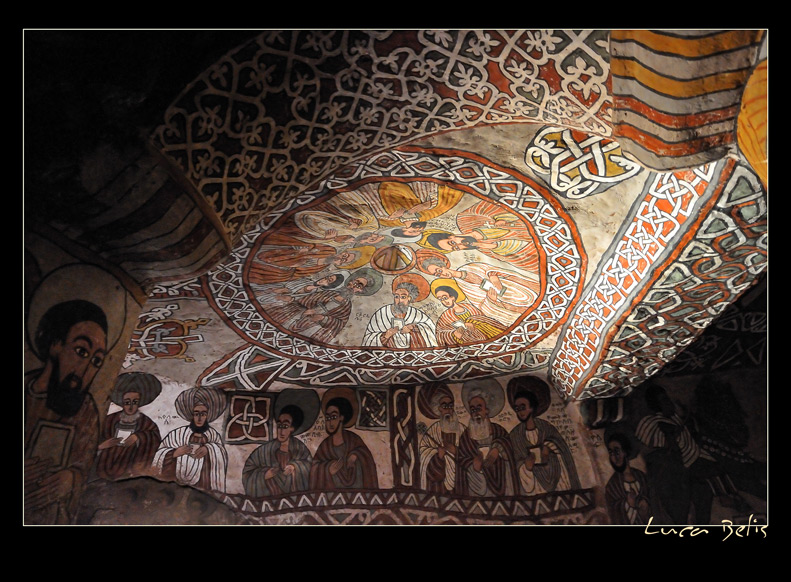
We only understand how we are who we are when we consider the influences that have come to bear on our ancient community. This is true of the controversies and pressures which were faced in the distant past, in times of theological disagreement and persecution, but also in regard to more recent experiences which have coloured our beliefs and practices to some extent.
The 19th century was a period in which different Protestant groups all attempted to influence the Coptic Orthodox Church of Alexandria. Although there was a continuum of views of the Orthodox Church held by these Protestants, they were all convinced that the Coptic Orthodox Church was in a very low state, and hardly even Christian at all. They were determined to renew the ancient Church of Alexandria by introducing Protestant teachings of one kind or another, and encouraging the Coptic Orthodox to abandon those teachings and practices which were offensive to Protestant ideas.
I will be considering some of the reports which were published in the British media during the 19th century to gain insight into the views of the Coptic Orthodox Church held by Protestant Christians, and what actions were planned and undertaken to move the Coptic Orthodox Church in a more Protestant direction.
In a report in the Newry Telegraph, 16th December 1841, it was reported…
The Coptic Patriarch has consecrated as Abuna, or Bishop of Abyssinia, an Egyptian youth, who was educated by a Missionary of our Church; and several of the Coptic Clergy have applied to our Missionaries for the Holy Scriptures and other religious books, and have held friendly communications with them upon spiritual subjects.
This was the outworking of one of the ambitions of the Protestant missionaries. Nor is it necessary to consider that their motives were not honorable. They considered the Coptic Orthodox Church to be spiritually dead, and they hoped that their Protestant teachings would reinvigorate it. Their method was to reach the youth in the Church, and by convincing them of the truth of Protestant faith and practice, to so introduce it into the Coptic Orthodox Church in an indirect manner, as the youth became priests and bishops themselves.
It seems that they had succeeded. One of the youth who had been trained by their missionaries was not ordained simply as a priest, but as the Abuna of the Orthodox Church of Ethiopia. This was a singular triumph for their missionary endeavours. Other clergy in Egypt were already turning to them for Protestant translations of the Scriptures and other Protestant instruction. It must have seemed that the prospects for all of the Orthodox Church of Egypt and Ethiopia becoming Protestant were increasing.
Perhaps what is being described in this newspaper report is not entirely as I have described it? The American Cyclopaedia, published in 1873, speaks about this event in these terms…
In 1830 the first Protestant missionaries, Gobat (subsequently Anglican bishop of Jerusalem) and Kugler, arrived in Abyssinia; they were soon followed by others, among whom Isenberg and Krapf have become best known. They obtained political influence, and in 1841 a pupil of the English Protestant mission school in Cairo, Andraos, was consecrated, under the name of Abba Salama, abuna of Abyssinia by the Coptic patriarch of Alexandria. Through him they hoped to gain the Abyssinian church for an evangelical reformation, and the hope was strengthened when a prince apparently devoted to them became, under the name of Theodore, ruler over all Abyssinia. But Theodore, when his power was fully established, banished or imprisoned the missionaries; and the abuna, who remained friendly to the Protestants, though he did not like to hear of conversions, died a prisoner in 1867.
The Ethiopian Abuna was always a Coptic Orthodox priest at that time. consecrated as the Bishop of Ethiopia. The nation had been without a bishop for some time, with all of the inconveniences and disturbance associated with the lack of episcopal oversight. The Governor of the province of Tigre, seeking to assert his own increasing authority sent a commission including the Roman Catholic bishop in Egypt, to arrange for the consecration of an Abuna under his own control. The hope was that the new Abuna would also be sympathetic to the Roman Catholic Church.
In fact, this ambition was not accomplished, and according to the traveller Henry Blanc, “the Patriarch chose for that dignity a young man who had received part of his education at an English school at Cairo, and whose views were more in favour of Protestantism than of the Copt’s long-standing adversary, the Church of Rome.” He was only 20 years old at the time, and had a complicated and problematic career in Ethiopia. Blanc, who knew him personally, says…
Towards Protestants he was better inclined; still, he would not hear of “conversions.” Missionaries might instruct, but they had to stop there; and when, as it happened, some Jews were led by the teachings of the missionaries to accept Christianity, they had to be baptized and received as members of the Abyssinian Church.
Had he been an outright convert himself to Protestantism, this would have caused undoubted controversy but could probably have been dealt with quickly. It was the lasting permission which was given, in Ethiopia and in Egypt, for Protestant missionaries to teach freely, as long as those listening and learning did not leave the Orthodox Church, which caused more lasting harm, since it introduced Protestant ideas and theology into the heart of the Church itself.
